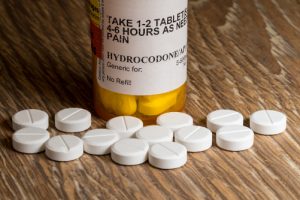American Opioid Epidemic – How Dentists Can Help
Written by Consumer Guide to Dentistry Last modified on November 21, 2017
During a recent conversation with the CEO of Ceatus Media Group (parent company of Consumer Guide to Dentistry) about content development for the site, he mentioned that he’d just had his wisdom teeth removed at the same time as having an implant placed. The implant required a bone graft and sinus lift, and in hindsight, it was probably a bit much to bite off in a single treatment. But like many people juggling a busy schedule and a limited amount of free time, he wanted the convenience of having both procedures done simultaneously and was willing to put up with the pain.

Fortunately, he was prescribed some heavy-duty painkillers that helped to take the edge off. He’d commented on the fact that he was happy to have the relief, but taken aback at the strength, noting that it was easy to see how people could get hooked on them. Fortunately his pain subsided in a matter of days, meaning he wasn’t reliant on the meds for too long. His experience got us talking about the role that prescriptions drugs play in the world of dentistry.
It’s no secret there’s an opioid epidemic in the United States — the opioid overdose death rate has been climbing for more than a decade, with 2015 spiking as the highest on record — but what may surprise you to hear as it did us is that the problem is somewhat rooted in dental care.
When I had my wisdom teeth removed at age 17, I was prescribed Vicodin for pain management. It was my first experience with opioids and I still recall being taken aback by the unfamiliar feeling of its strong effect. Dentists are responsible for approximately 12 percent of all opioid prescriptions in the U.S. and like me, many teens get their introduction to opioids through dental care when they have their wisdom teeth removed. (A Harvard study found that dentists are among the leading prescribers of opioids, the majority of which were for those aged 14 to 17.)
Faced with this growing opioid problem, an increasing number of medical experts and dentists are now evaluating their methodology for prescribing opioids, noting that this level of pain medication is not always necessary, and that over-the-counter pain medications like Tylenol and Advil are sufficient for the majority of all extraction patients.
The American Dental Association (ADA) lists a “Statement on the Use of Opioids in the Treatment of Dental Pain” on their website intended to help further the understanding about when opioids are an appropriate tool in dental care. Among the many things listed by the ADA include things like better screening through which patients are evaluated for prior substance abuse issues, in addition to medical and dental history. The ADA statement also highlights the importance of dentists communicating with patients about the potential dangers associated with misuse of opioid painkillers, in addition to the possible inclusion of pain specialists to help weigh in on whether or not an opioid prescription is warranted. Rather than relying on opioids to serve as the pain-relief drug of choice for extractions and other dental procedures, dentists are advised to consider nonsteroidal anti-inflammatories (NSAIDs) as the primary option for managing acute pain.
So what’s the takeaway?
For dentists, recognizing that they are on the front line of the opioid crisis isn’t to suggest that they are necessarily at fault, or part of the problem. It’s simply highlighting a fact that the industry has an opportunity to position itself as part of the solution. Opioid addiction and abuse is rooted in many things, addressing any one of which is not in and of itself a solution to the problem. However, there is a clear link between opioid use among teens and dental care, meaning that dentists have an opportunity to play a small part in helping to stem abuse.
For parents, given that the majority of dental patients being prescribed opioids are 14 to 17 years old, it’s important that parents involve themselves in the conversation. If your child is prescribed an opioid after tooth extraction (or for any reason), make sure that the prescribing dentist or physician makes clear why NSAIDs would not suffice for pain management. When opioids are warranted, monitor their use and be sure to discard any unused pills.
To learn more about the issue, check out the report by NBC News: http://www.nbcnews.com/health/health-news/deadly-triangle-dentists-drugs-dependence-n596601


